Isolation falls to Qatar’s share from Trump’s sword dance
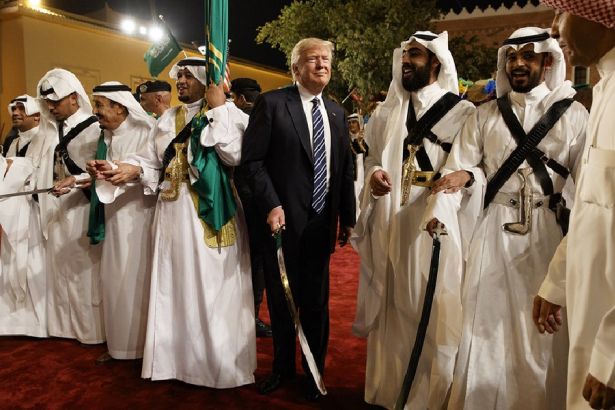
Following the U.S. President Donald Trump’s ostentatious Saudi Arabia visit came to the fore due to a $100 billion deal involving "the purchase of lots of beautiful U.S. military equipment" with his own words, the escalating tensions in the Gulf cannot be ceased. After the ceremonial sword dance of the Saudi King Salman bin Abdulaziz Al Saud with Trump, the coalition led by the Riyadh began to attack the small yet influential country of the Gulf, Qatar.
Since Trump's visit at the end of May 2017, it was firstly claimed that Qatari Emir Tamim made statements deviating the U.S. regional policy during his speech at the military graduation ceremony in Al Udeid Air Base where is the symbol of the alliance between Qatar and the United States.
The statement of Qatar’s Emir describing Iran as 'a regional power that cannot be ignored', and Hamas and Hezbollah as 'the legitimate resistance movements' as well has been turned into a target by Saudi Arabia and the United Arab Emirates (UAE). Yet, Qatar claimed that the official Qatar News Agency (QNA)’s website has been hacked and a false statement attributed to the Emir has been published.
Following this incident, media organs affiliated to Saudi Arabia and the UAE reported particular news including allegations that 'Qatar is a supporter of Al-Qaida and ISIS terrorism and that 'it organized a conspiracy against the Arab countries with the help of the Muslim Brotherhood network acting under auspices of Qatar.' Qatar has been denied access to the website Al-Jazeera, a highly effective media organ in the Arab world, by Saudi Arabia, the UAE and Egypt. The crisis reached a peak on June 5 when Saudi Arabia, Bahrain, Egypt and the UAE cut diplomatic ties with Qatar and suspended all flights from this country.
HISTORICAL ANIMOSITY
Qatar, described as "nothing but 300 people ... and a TV channel" by the former director general of Saudi Intelligence Agency Bandar bin Sultan, has a population of 2.6 million, while 88 percent of this population comprises of 'foreigners'. However, with its 25 billion cubic meters of natural gas reserves, the country has quite effective instruments in regional politics.
First of all, the U.S.’s largest military base in the Middle East is located in Qatar. Besides, Qatar draws attention as the pioneer of the Muslim Brotherhood network which has a distinct social force almost all over the Arab countries. The Qatari intelligence has very strong ties with Al-Qaida as it can be seen in Syria and Yemen.
This is not the first crisis between Qatar and Saudi Arabia in the Gulf. In 1996, Saudi Arabia and the UAE supported the failed military coup by Jassem bin Hamad against his cousin Sheikh Khalifa bin Hamad al-Thani, the father of the current Qatari Emir Tamim.
The previous crisis between two Gulf countries had erupted in 2013. Saudi Arabia could not accept the leadership of Qatar in the process of so-called 'Arab Spring' through the Muslim Brotherhood under the auspices of the Doha in Libya, Tunisia and Egypt.
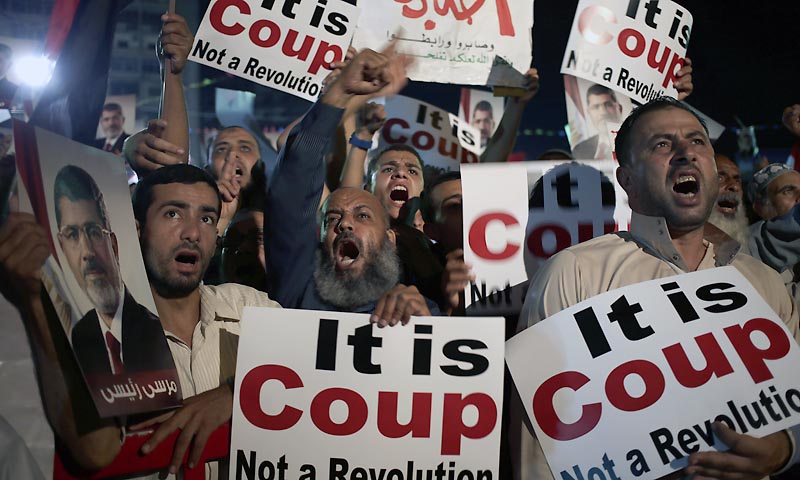
The failure of the Saudi-sponsored politicians in Egypt against the Muslim Brotherhood and the prominence of Qatar as a 'pioneer of the armed oppositions' in Syria caused this crisis to reach unrestrainable dimensions. As a result of the U.S. interference, the Saudis firstly took the Syrian issue from Qatar’s protectorate, then Abdel Fattah Al-Sisi supported by Saudi Arabia overthrew the Qatar-backed Muslim Brotherhood with a military coup in Egypt. These developments were followed by a 'palace coup' in Qatar, and the Qatari Emir of that period Khalifa bin Hamad, who attracted the Saudis’ fury, had to abdicate the throne to his son Tamim.
ORIGINS OF THE CRISIS: THE NEW ORIENTATION OF THE U.S.
The re-escalation of tensions between Qatar and Saudi Arabia was due to the government reshuffle in the United States. Unlike his predecessor Obama, Trump’s new regional policy portraying Iran as a total target was saluted by the agreements worth $350 billion by Saudi Arabia which has never dissembled its displeasure from the ex-U.S. government’s seeking a reconciliation with Iran.
The Obama administration, which cannot bear the consequences of such a rapprochement with Iran, set its course to the partition of Syria from ‘regime change in Syria’ under the mask of ‘weakening and destroying ISIS’. A year later, the Obama administration reached a nuclear deal with Iran.
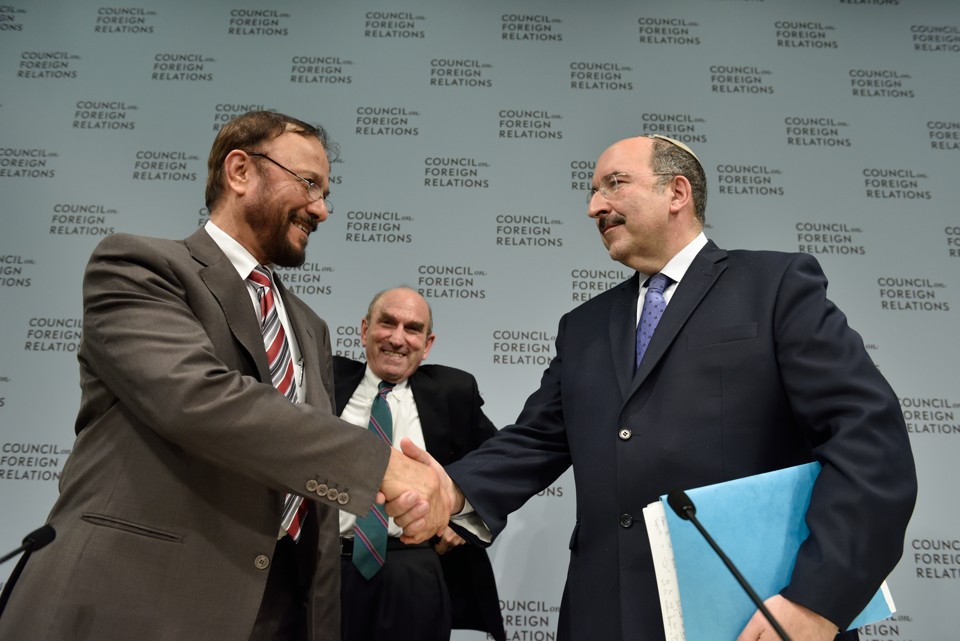
Anwar Majed Eshki (L), Dore Gold (R)
Israel and Saudi Arabia troubled with these steps brought the bilateral secret talks to the light. Thus, the authorities of the two countries began to explicitly speak of a de facto united front against Iran for the first time in this period. In 2015, Saudi representative and the Royal Advisor Anwar Majed Eshki called for "an establishment of a common Arab military force against Tehran" at the meeting with the Director-General of Israel's Foreign Ministry Dore Gold.
When Trump took over the administration, he began to take steps to canalise this collaboration between Saudi Arabia and Israel towards an official alliance. The U.S. Secretary of Defense James Mattis, who visited Israel in April 2017, stated after the meeting with his Israeli counterpart Avigdor Lieberman that the Washington aims to establish a regional defence alliance against Iran in the Middle East. During his visit to Riyadh, the main agenda of Trump was also the establishment of a regional alliance against Iran which he accused of "being the supporter of terrorism in the region".
COMPLIANCE PROBLEM OF QATAR
Yet, a full-scale rapprochement with Iran resulted in the termination of the U.S traditional policy of acting in unison with all countries that establish the Cooperation Council for the Arab States of the Gulf (GCC) in the region. As a matter of fact, Qatar has compliance problems with this plan due to both its common economic interests with Iran and the current regional claims.
First of all, a full-scale rapprochement with Iran also threatens the Qatar’s economy. The most important gas field of the Emirate, North Field, is located in the Persian Gulf, while a part of it is in Iranian territorial waters. Iran granted an operating permission of this reserve called South Pars to Qatar’s most significant ally in Europe, France’s Total Global Company.
Testing ground of Trump’s administration’s ‘new regional alliance’ is Syria… The strategy of the U.S. government, founded during the Obama’s presidency and briefly aimed to invade the region remaining the outside of Damascus-Aleppo line in order to provide this region being uncontrollable for the Assad government under the mask of ‘fighting against ISIS’, is quite compatible with the Trump administration’s strategy turning Iran into a target.
Trump particularly aims to create a kind of Saudi sphere of influence on the road line connecting with Amman and Baghdad through his jihadist proxies along Jordan border of Syria. In this respect, Syria’s Al-Tanf town, where the U.S. forces were deployed, is located in the middle of this line. The Syrian army and Iran-backed Shia militias were targeted by the U.S. warplanes as they gain ground towards this town last month.
In this strategy founded during the Obama administration, there is no room for jihadist terror organisations under the tutelary of Qatar such as Al-Qaida’s Syrian incarnation Hay'at Tahrir al-Sham (with its former name Al-Nusra Front) and Ahrar al-Sham. Moreover, the U.S. press and think tanks found out (!) that Syria’s Idlib province near the Turkish border, where has been controlled by these two jihadist terror organisations for a while, is actually an Al-Qaida Emirate. After this finding, it is written that the U.S. has no such an obligation to protect Idlib.
Pro-Turkey and pro-Qatar think tanks and journalists based upon the idea of ‘regime change in Syria’ advocate that the U.S decision to increase heavy weaponry supply to the Democratic Union Party (PYD) in Syria despite the reactions of the Ankara will cause great troubles in the future, and Turkey is right in the issue of terror threat that can come from the Kurdish militias in the Northern Syria.
Following the signing of the ‘non-conflict zones’ agreement by Turkey, Russia and Iran, the conflicts in the Idlib front ceased. Thus, the Syrian army now accelerated its military operations in the eastern and southern regions of the country in order to sabotage the new plans of the U.S. and dispatch the enemy.
Qatar found itself to be eliminated in Syria after the U.S. looking out for the interests of Saudi Arabia-Israel alliance in the field with priority. Turkey, thanks to the Russian intervention in Syria, got rid of sharing the same ‘fate’ with Qatar for now.
PALESTINE AND LIBYA
The Palestinian Project of the Qatar-Turkey line was also a victim of Trump’s new orientation. Both countries promised Israel a ‘tamed Hamas’. This plan fundamentally was moderating some parts of Hamas that can be threat risks for Israel. It was the first step of this plan that the Hamas leader Khaled Meshal abandoned Damascus and moved to Doha, the capital city of Qatar.
Following the incident, Qatar, turning into the ‘generous father’ of Gazza, aimed to balance aids provided by Iran to Hamas and completely terminate the relations between Hamas and the Tehran. Qatar-Turkey initiative showed that this partnership has come a long way after Hamas unclosed a political document recognising Israel last month.
Yet, Israel did not even need a "tamed Hamas" in this new period when Iran has been turned into a target. Eventually, Prime Minister of Israel Benjamin Netanyahu tossed the Hamas new policy paper on Israel into bin two years ago, in a live broadcast.
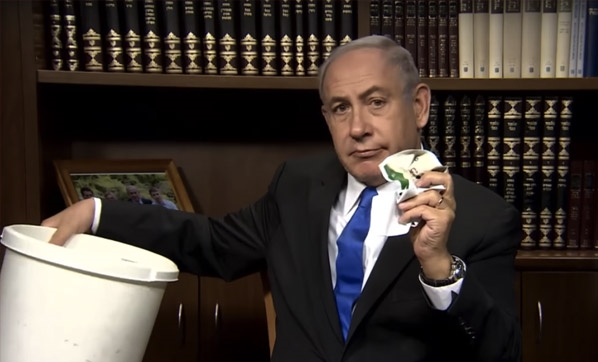
Netanyahu calls Hamas document a lie, tosses it into a waste bin.
Qatar still has an active role in Libya despite being eliminated in Syria and Palestine. The most significant ally of Qatar in Libya is again Turkey. Both countries support the Tripoli and Misrata-based armed militants and politicians. These groups are in a power struggle occasionally witnessing violent conflicts with the UAE-backed Tobruk government.
Egypt also takes sides with the Tobruk government in the power struggle between Qatar-Turkey alliance and the UAE. As a matter of fact, the Egyptian government thinks that Turkey promotes the development of both the Muslim Brotherhood in Egypt and ISIS in Libya.
WEAKNESSES OF THE SAUDIS
Saudi Arabia, backed by two significant elements of the Gulf such as the UAE and Egypt, seems to have gained a serious advantage over Qatar.
Yet, the major forthcoming danger for the Saudis in their 'regional leadership' efforts is not the Qatar’s political or economic strength. First, as the Yemen war has shown, Saudi Arabia is militarily a ‘paper tiger’. Besides, Saudi Arabia has clashing interests with its allied countries even if this conflict of interests has not yet been transformed into a crisis.
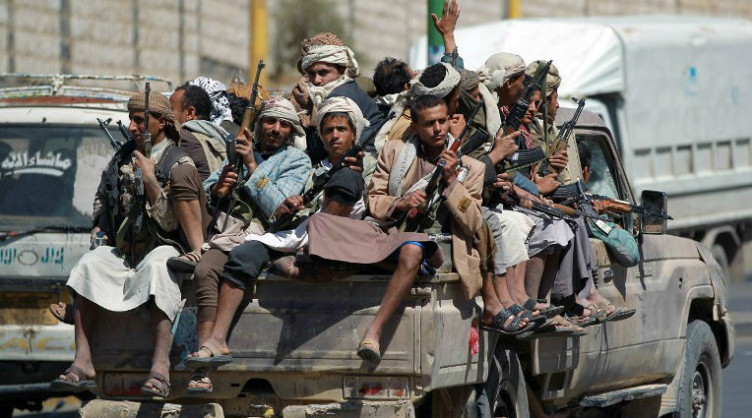
Yemenis fighting the Saudi-led invasion of their country. Saudis are taking a regular beating in Yemen on the ground.
For instance, the military fiasco that the Saudis experienced in Yemen led the UAE to a different strategy. As the delusiveness of the plans rises to the surface with regard to defeating the "Iran-backed" Houtis by the Saudis and the reestablishment of all the power by the former Head of State Mansour el-Hadi in Yemen, the UAE turned its route to the division of Yemen into two from the desire of control all Yemen.
The former UAE-allied Aden Governor Aidaroos al-Zubaidi, whose dismissal by the President Mansour Hadi caused protest demonstrations, wanted to be established a Gulf-backed state in the Southern Yemen rather than controlling all country. Furthermore, it is claimed that the UAE keeps in touch with the Moscow to balance the Iranian dominancy in the North with Russia in a case of possible division of Yemen into two.
In the matter of Syria, Egypt has a contradicting stance with Saudi Arabia. Egypt opposing the decisions of the United Nations Security Council against the Syrian government takes a stance concerning the prevention of this country to be a jihadist paradise like Libya.
A limited number of Egyptian troops are already in Syria to gain experience in the war against jihadists. While Egypt enters into armament deals with Russia, it leans towards the Moscow’s efforts to get return the former Gaddafi supporters to the political scene in Libya. It is also claimed that Egypt and the UAE mediate the Russia’s weapons sale to the Tobruk government.
Saudi Arabia is far from being a militaristic and political centrepiece within all these thorny regional politics.




